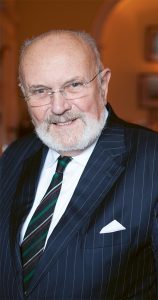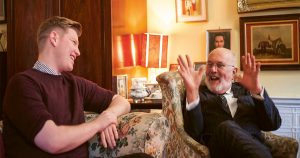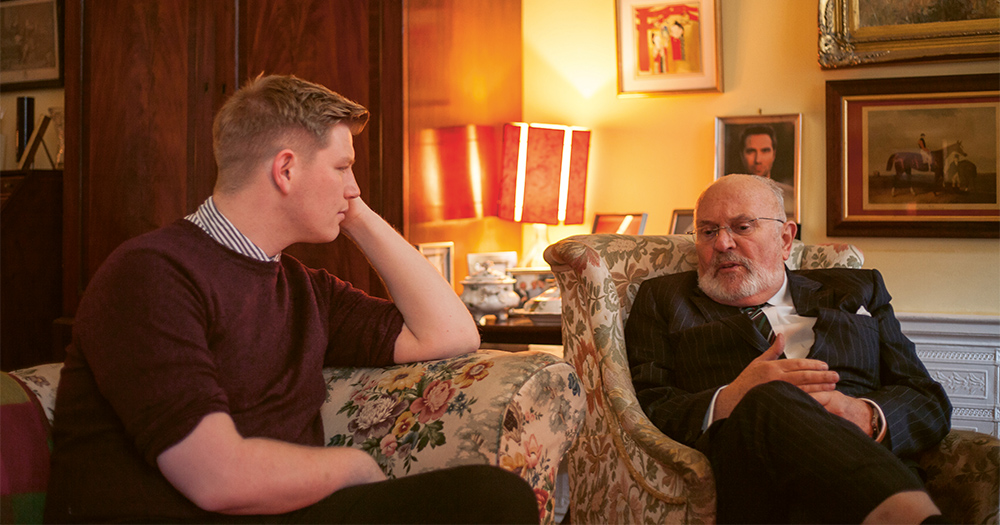In a series of discussions, members of our community talk through generational lines about how we grow, adapt and take care of ourselves. In this discussion, Senator David Norris speaks to Samuel Riggs.
David and Samuel
Samuel: You’re credited with kicking off the whole gay liberation movement in Ireland, how did you look after yourself around that time. Was it really stressful?
David: I suppose I was really stressed at one stage but that was actually the thing that gave me the possibility of taking the action. I’d originally been in charge of the legal group in the Irish gay rights movement. That meant defending men who were found in compromising circumstances. We had a very good record, we won every single case, but I had hoped one of them would try a constitutional defence. Of course the last thing they wanted was extra publicity.
So we started looking at the possibility of my taking a case. The difficulty was to show that I had been injured or damaged by the law. One thing that had happened was that I’d had a collapse in Switzer’s restaurant. They brought me to Baggot Street Hospital because they thought I’d had a heart attack. It turned out to be alright, but under investigation I acknowledged I was gay. They sent me off to a psychiatrist who told me,’The laws in this country are very antagonistic to gay people which would be damaging to your health. You should go and live in the south of France.’ That really infuriated me but it gave me the opportunity to take the action. But my older brother was in great difficulty at that time, my mother had just died, the fellow I was in love with had gotten married and gone to live in Canada, so with everything that was happening it was no wonder I was stressed!
Samuel: Did you ever suffer with your mental health?
David: I never suffered with mental health but I did suffer from depression after the presidential election. But so many filthy and dishonest things were said about me during that time. There was a savage attack upon me by the media which was extremely homophobic.
Samuel: How difficult was it for you after the election? And what brought you out of it?
David: For two years I didn’t laugh, and I laughed all the time. That was awful. I just didn’t feel like laughing. But I gradually got my laughter back. I suppose it was friends, also I’m quite religious, so I took great comfort in that. I used to go to a gym in Capel Street, I would force myself, I wouldn’t want to go down, but after a while of exercising I felt fantastic and I would cycle home singing away.

Samuel: I’ve had my own mental health problems.
David: About being gay?
Samuel: Yes. We lived in Brighton which is like a gay metropolis, and then I came to Carlow with my family when I was 12, which was a bit of a culture shock.
David: Were you aware of being gay as a child.
Samuel: No, it was never a thing I had to think about in Brighton, but in Carlow, everyone was calling me ‘gay; ‘fag’, all this kind of stuff, and I was like – ‘That’s not me;. But it was me. I had an English accent and I was effeminate and I was a bigger guy, so I was different.
David: You should have kicked the shit out of them.
Samuel: I’m a bit of a gentle giant! Then I turned 17 and I was actually outed by a very nasty person on the internet to all my friends and family.

David: Was this nasty person gay?
Samuel: Yes. We can be quite mean to each other a lot of the time. We kind of in-fight a lot.
David: In my generation, as a result of the pressure between the force of law and the church, people could be very very neurotic. I don’t see that in the young people of today.
Samuel: I think we get it a little bit differently, we have social media, so instead of it coming directly people are sniping at each other from the sides. It can get quite nasty.
David: I don’t have an awful lot of contact with the gay community, because it’s built around bars. I had a very aggressive cancer after the presidential election and I had a liver transplant and as a result I’m not supposed to drink. But people know who I am and if I go into a gay pub I tend to get rather drunken people going ‘Let me tell you about my boyfriend’.

Samuel: It does seem like you have to go out to bars to meet gay men.
David: Well, you could use the internet. Grindr.
Samuel: I don’t have it anymore! Grindr is terrible for your mental health. You’re seeing all these muscled people and I look like a plate of mashed potato. You can get a lot of nastiness on it. People tell you you look fat, you don’t look good. I decided to give it up for my mental health.
David: A friend of mine showed it to me on his phone about two years ago. I couldn’t believe it. He twiddled up people in the vicinity looking for sex. The nearest one was about a hundred yards away!
© 2018 GCN (Gay Community News). All rights reserved.
Support GCN
GCN is a free, vital resource for Ireland’s LGBTQ+ community since 1988.
GCN is a trading name of National LGBT Federation CLG, a registered charity - Charity Number: 20034580.
GCN relies on the generous support of the community and allies to sustain the crucial work that we do. Producing GCN is costly, and, in an industry which has been hugely impacted by rising costs, we need your support to help sustain and grow this vital resource.
Supporting GCN for as little as €1.99 per month will help us continue our work as Ireland’s free, independent LGBTQ+ media.

